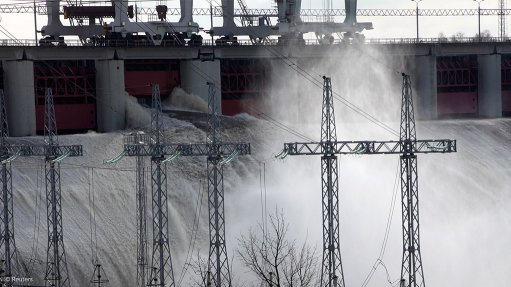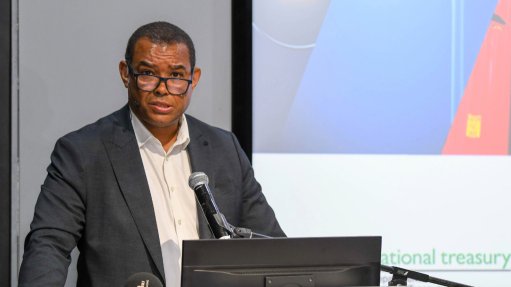Arkle identifies lithium in all Makgadikgadi Salt Pans samples
Aim-listed Arkle Resources says analysis has identified lithium in all 20 samples taken from a portion of its 937 km2 of licences in the Makgadikgadi Salt Pans, in Botswana.
Despite lower grades of lithium in this first-pass sampling, the company stated that it was normal for lithium concentrations to fluctuate in these environments.
Arkle's directors note that it is highly plausible that higher lithium levels will be found in other parts of the pan within its licence area.
"We expected to find lithium traces in the brines, and we have in all samples. The grades in these samples from one part of the pan near the edge are low, but lithium grades can vary significantly over an area and, remember, we have access to 937 km2 of ground," Arkle chairperson John Teeling said on February 25.
The key point is that lithium has been detected in all samples and that higher levels may be found in other areas.
The company says there are also significant grades of magnesium that may be economically extracted as an additional product under a new process of direct lithium extraction.
"What is seriously interesting is the widespread presence of good grades of magnesium above 1%. Modern extraction methods make magnesium an asset.
“Eight of the 20 samples have grades above 1%. Also within the licence on the edge of the pan is mapped ultrabasic rock. Ultrabasic rocks are known to contain a very high magnesium content which may be the source of the high levels of magnesium noted in the brines," Teeling said.
The direct lithium extraction process is potentially more efficient, environment-friendly and cost-effective than traditional extraction methods.
The high levels of magnesium detected in all of the samples, including eight samples that were over 1% magnesium content, create a compelling potential magnesium deposit, which will also guide further exploration work on the pan.
The next steps will involve preparation for shallow drilling to access brines down to a depth of 30 m to obtain a bulk sample analysis for direct lithium extraction.
The current results are from the second stage of a three-part exploration of Arkle's ground.
The first stage revealed brines at an average depth of 1 m over the block.
The second stage involved small samples to determine whether the brines contained lithium, which has now been verified.
The third stage will consist of an extensive drilling campaign to evaluate the grade of contained lithium and, as a consequence of the magnesium results, an additional focus on magnesium.
Arkle said recent advances in the extraction of metals from brines, particularly direct lithium extraction, have the potential to make production more efficient. This process also allows for magnesium extraction using membranes, which may be significantly cheaper than historic production methods. This offers an additional stream of future revenue at low additional costs, the company said.
Arkle said demand for magnesium was strong and is expected to grow globally by about 7% a year. This is because magnesium alloys are significantly lighter than steel or aluminium, making them ideal for batteries, electric vehicles, and aircraft use.
As such, magnesium has been designated a critical material by the US administration. China currently dominates global production.
"It is important to note that exploration for brines is cheaper than hard rock. Holes are typically less than 30 m deep. The ground is flat, and access is easier. We now need to plan and execute a defined grid drilling programme," Teeling said.
Article Enquiry
Email Article
Save Article
Feedback
To advertise email advertising@creamermedia.co.za or click here
Comments
Press Office
Announcements
What's On
Subscribe to improve your user experience...
Option 1 (equivalent of R125 a month):
Receive a weekly copy of Creamer Media's Engineering News & Mining Weekly magazine
(print copy for those in South Africa and e-magazine for those outside of South Africa)
Receive daily email newsletters
Access to full search results
Access archive of magazine back copies
Access to Projects in Progress
Access to ONE Research Report of your choice in PDF format
Option 2 (equivalent of R375 a month):
All benefits from Option 1
PLUS
Access to Creamer Media's Research Channel Africa for ALL Research Reports, in PDF format, on various industrial and mining sectors
including Electricity; Water; Energy Transition; Hydrogen; Roads, Rail and Ports; Coal; Gold; Platinum; Battery Metals; etc.
Already a subscriber?
Forgotten your password?
Receive weekly copy of Creamer Media's Engineering News & Mining Weekly magazine (print copy for those in South Africa and e-magazine for those outside of South Africa)
➕
Recieve daily email newsletters
➕
Access to full search results
➕
Access archive of magazine back copies
➕
Access to Projects in Progress
➕
Access to ONE Research Report of your choice in PDF format
RESEARCH CHANNEL AFRICA
R4500 (equivalent of R375 a month)
SUBSCRIBEAll benefits from Option 1
➕
Access to Creamer Media's Research Channel Africa for ALL Research Reports on various industrial and mining sectors, in PDF format, including on:
Electricity
➕
Water
➕
Energy Transition
➕
Hydrogen
➕
Roads, Rail and Ports
➕
Coal
➕
Gold
➕
Platinum
➕
Battery Metals
➕
etc.
Receive all benefits from Option 1 or Option 2 delivered to numerous people at your company
➕
Multiple User names and Passwords for simultaneous log-ins
➕
Intranet integration access to all in your organisation


















